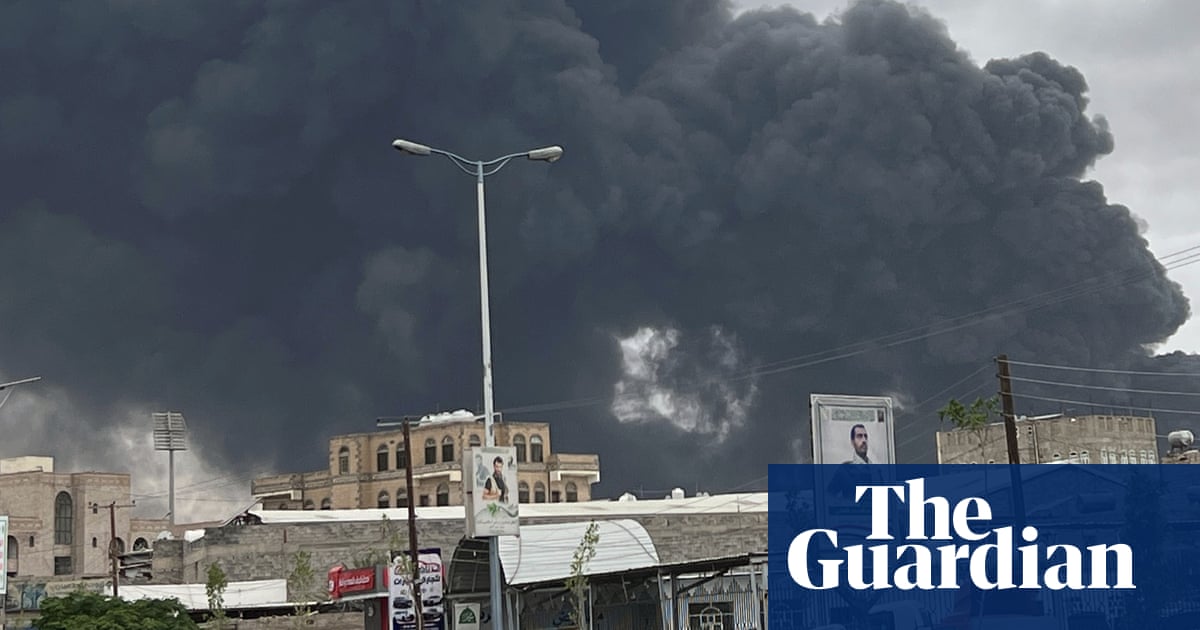The US will halt its bombing campaign against Yemen’s Houthis afterDonald Trumpclaimed the Iran-aligned group had agreed to stop targeting shipping in the Red Sea.
The halt – announced by the US president during an Oval Office meeting with Canada’s prime minister, Mark Carney, came on a day in which Israel claimed its jets had fully disabled Yemen’s main airport, including three civilian aircraft on the ground, in retaliation fora missile strike on Sundaythat hit within the perimeter of Tel Aviv’s Ben Gurion airport.
“The Houthis have announced … that they don’t want to fight any more. They just don’t want to fight. And we will honour that, and we will stop the bombings, and they have capitulated,” Trump said. He provided minimal details of the agreement and denied that he had struck a deal.
“We just found out about that. So I think that’s very, very positive … I will accept their word, and we are going to stop the bombing … effective immediately,” he said.
It was unclear, however, how accurate Trump’s description of the contacts between the Houthis and the US was, and there was no immediate response from Houthi officials.
The Trump-described agreement follows a recent sharp intensification of air raids on Yemen,including with the participation of UK forces last week. Some of those strikes claimed civilian lives as well as those of Houthi fighters.
The Houthis have been firing at Israel and at shipping in the Red Sea since Israel began its military offensive against Hamas in Gaza after the Palestinian militant group’s deadly attack on Israel on 7 October 2023.
Trump said Washington would take the Houthis’ word that they would not be attacking any more ships.
The Trump administration launched its operation in mid March, markedly increasing the number of air raids against Yemen, after a campaign of intermittent strikes.
Since then the US military says it has “hit over 1,000 targets” inYemen, claiming to have killed Houthi fighters and leaders, “including senior Houthi missile and UAV officials, and degrading their capabilities”.
There has been a number of reported civilian deaths, including last week when local officials said theUS had a struck a detention centre for nationals of African countries in Saada, reportedly killing at least 68 people.
An 18 April raid on Ras Isa fuel portalso killed at least 80 people and wounded 150 others.
The Trump administration has maintained that the strikes are in self-defence in response to Houthi strikes on US commercial and naval ships. They have denied the six-week campaign requires congressional approval.
Attacks by the Houthis have prevented shipsfrom passing through the Suez canal – a vital route that normally carries about 12% of the world’s shipping traffic.
Tensions between the Houthis and Israel – against whom the group said it had begun the attacks – have been high since the Gaza war began, but have risen further since a Houthi missile landed near Israel’s Ben Gurion airport on Sunday, prompting Israeli airstrikes on Yemen’s Hodeidah port on Monday and Sana’a airport on Tuesday.
The UN special envoy for Yemen, Hans Grundberg, said the strikes carried out by both sides marked a “grave escalation in an already fragile and volatile regional context”.
Sign up toHeadlines US
Get the most important US headlines and highlights emailed direct to you every morning
after newsletter promotion
The Israeli military claimed on Tuesday that its airstrike on Yemen’s main airport had disabled it.
“The strike was carried out in response to the attack launched by the Houthi terrorist regime against Ben Gurion airport,” the Israeli military said in a statement.
“Flight runways, aircraft and infrastructure at the airport were struck,” it added.
A Yemeni official said the airport had been “completely destroyed” by the strikes.
“Three planes out of seven belonging to Yemenia Airlines were destroyed at Sana’a airport, and Sana’a international airport was completely destroyed,” the official said.
Israel’s defence minister, Israel Katz, said the strike should be seen as a warning to the “head of the Iranian octopus”, which he said bears direct responsibility for attacks by the Houthis against Israel.
The Houthi-affiliated al-Masirah television channel said three people had been killed and 38 people wounded in the airstrikes on the airport, as well as a cement factory, and the Haziz power station.
AP, Reuters and AFP contributed to this report
